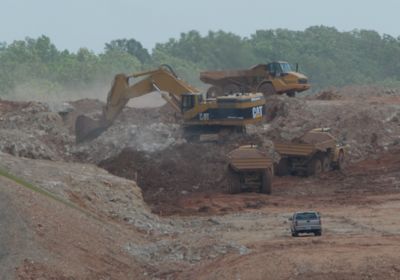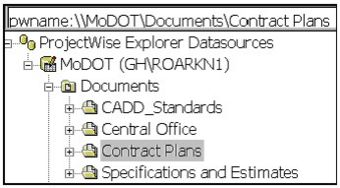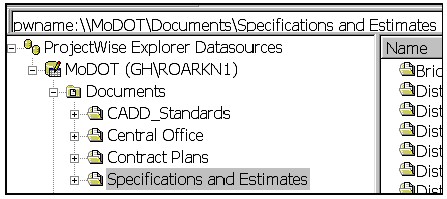237.9 Submission of Plans and Supporting Documents

237.9.1 Final Design Plans Submittal
In preparation for the bid opening of a project, the district submits the following information in an electronic format to Design: a letter of transmittal, a full-size, electronically signed and sealed set of plans, job special provisions, estimate, subsurface data and other miscellaneous data necessary to process the job. The district retains all original data submitted in the ProjectWise document management system. Submittal of paper plans is no longer allowed unless specifically approved by Design.
| Figures |
| a cover letter |
| example of a pre-bid meeting agenda |
| Forms |
| District Final Plans Checklist (Form D-12) |
| Equipment and Materials List (Form D-15) |
| Conflict of Interest Form (MHTC Agenda Checklist) |
Plans may not have mixed English and metric pay items in the contract. For projects let in combination, project managers are to ensure all the projects are designed in the same units (i.e., all English or all metric).
237.9.1.1 Letter of Transmittal. The letter of transmittal enumerates any design change since preliminary plan approval, unless the change has received prior approval. It provides a current review of the status of the project (right of way clearance, utilities, recommended bid opening date, etc.). All variations from standard practice and design standard are mentioned.
237.9.1.2 Plans. Detail plans submitted to Design must be a complete set of construction plans, except standard plans and bridge drawings.
237.9.1.3 Job Special Provisions. An electronic copy of the job special provisions is provided along with the transmittal letter via the ProjectWise management system. The job special provisions must be submitted in Word format.
237.9.1.4 Estimate. An electronic copy of the project estimate is provided along with the transmittal letter via the ProjectWise document management system. The district or consultant estimate submitted to Design is not to contain any bridge estimates. Bridge will submit all bridge estimates.
237.9.1.5 Equipment and Materials List. All projects containing permanent highway lighting or traffic signal items, or temporary lighting and signal items to be retained by the Commission, require an Equipment and Materials List (Form D-15). An electronic copy of the form is to accompany a cover letter, and both the form and cover letter are included with the transmittal letter. The computer file containing the Form D-15 is transferred electronically to Design. The transmittal letter is to give the name of the file.
237.9.1.6 Conflict of Interest. The district is to ensure the conflict of interest status previously reported to program management is current. The district is to complete the MHTC Agenda Checklist, which can be found electronically in the Word forms under the MoDOT tab. This form is to be completed whether there has been a change in the status as previously submitted or not. For more information regarding conflict of interest, see Presentation for Location or Design Approval to the Commission and Plan Submittal and Filing.
237.9.1.7 Miscellaneous. The working days study and recommendation, utilities clearance certification letter, the Conflict of Interest form, and tabulation of quantities are submitted with every job. These items are usually attached to the transmittal letter. A District Final Plans Checklist (Form D-12), enumerating all data being submitted, is also attached to the transmittal letter. It is essential for the designer to check with the District Maintenance and Traffic Engineer on possible sources of materials for the job and to note these sources on the D-12 form. This information is critical when preparing the final project estimate.
237.9.2 Electronic Information
237.9.2.1 Estimates
Before submitting plans and project documents, verify that key project data is accurately entered in MoDOT’s project estimating software. Consult the “PROJECT INFORMATION” screen to verify the accuracy of the project data shown. This includes, but is not limited to, the route number(s), log and/or station miles, job description, location description, longitude and latitude. Identify specific routes when giving the route information. If the project involves multiple routes, list each of their numbers or abbreviations. Enter the longitude and latitude of the project midpoint. Longitudes and latitudes are used to analyze the distribution of funds, projects and construction types and accurate completion of this information is vital. Longitude and latitude coordinates may be obtained from MoDOT’s county maps, USGS maps, GPS devices, or other means. Enter these numbers as degrees, minutes and seconds. If seconds cannot be determined, these may be entered as “00”.
237.9.2.2 Horizontal and Vertical Alignments
Before submitting plans and project information for Automated Machine Guidance construction methods, verify that all horizontal and vertical alignments in the coordinate geometry database (a.k.a. GPK file) contain the final alignments used for developing the plans submitted and are accurate. The coordinate geometry database should not include any preliminary alignments used in the development of the plans.
237.9.3 Timing
All plans, specifications, and estimates (PS&E), except for projects within interstate right of way (regardless of the funding type) and forest highway projects, must be received in Design no later than 10 weeks prior to the bid opening date. All projects within interstate right of way, major bridge projects, forest highway projects, and other projects with full FHWA oversight authority must be received in Design no later than 14 weeks prior to the bid opening date. This will provide the minimum amount of time required for processing and printing plans and proposals, obtaining FHWA approval of the Traffic Control Plan, obtaining other required approvals, and advertising projects for bidding. The deadline for submitting extremely complex projects, or those projects requiring a pre-bid conference, must be coordinated with Design. All right of way clearances, utility adjustments, permits, agreements, bridge designs, archaeological and environmental matters, etc., are to be completed prior to the submission of plans for the bid opening.
237.9.4 Pre-Bid Conferences
Pre-bid conferences are held to increase potential bidders’ understanding of the plans and specifications. A pre-bid conference is not a substitute for a constructability review by the project team during plan development. Pre-bid conferences are required for all unique or complex projects, or projects with particularly difficult or unusual staging or construction methods. As a general rule, a pre-bid conference is to be held for any project with a programmed cost in excess of $20 million, although the cost of the project is not the only factor to be considered. Requests to waive the pre-bid conference requirement are submitted to Design, along with justification supporting the recommendation.
Pre-bid conferences are typically held the month prior to the month of the bid opening. The time and location of the pre-bid conference are set by the project manager in coordination with Design. Bidding documents are provided to potential bidders in sufficient time to provide an opportunity for review. In order to have the bidding documents prepared, all plans, specifications, and estimates must be submitted at the PS&E due date for the prior month’s bid opening. These bidding documents will be the final version, and will be advertised accordingly. Minutes of the pre-bid conference are to be completed by the project manager, and sent to all attendees and Design. Changes to the bidding documents as a result of the pre-bid conference will be handled as an addendum.
The MoDOT project manager is responsible for preparing an agenda for the pre-bid conference, and ensuring the proper topics are discussed. The following is a list of possible topics that may be discussed at the pre-bid conference:
- Project overview
- General discussion of the design philosophy used for this project.
- Status of right of way acquisition (if not clear).
- Status of utility adjustments (if not clear).
- Any non-standard pay items or special bid items including “No Direct Pay” items.
- Any bid item including work that may not be readily apparent to the contractor.
- Any item or condition out of the ordinary.
- All special provisions, especially any unusual conditions.
- Any constructability concern or anticipated difficulty during the construction.
- General clarification of major bid items.
- Discuss the available sub-surface information, the amount and type of excavation included in the project, and the availability of any necessary borrow material.
- Traffic Control Plan included in the plans and how it relates to any staged construction.
- Options for staging of construction.
- Critical schedules needing to be met, working days, completion date, and any critical sequences of construction.
- Phasing of construction contracts and how this project relates to other projects in the vicinity (future bid opening schedules, potential conflicts, coordination of other contracts, etc.)
- Special environmental concerns or practices that must be observed during construction including any permits and the special conditions imposed by them.
- Other agencies involved with this project.
- Identify any controversial items.
- Public concerns expressed during the design of the project.
- Unique design concerns, including special agreements made during right of way negotiations.
- Any contractor questions which have been answered prior to the meeting.

- Define the lines of communication between the contractor and MoDOT regarding questions the contractor may have about the plans (clarifications of plans, errors, omissions, etc.). Identify the proper contacts for questions.
- What the DBE goal will be for this project.
- Shop drawing procedures.
- Answer any questions regarding the payment process or change order
process.
237.9.5 Checking Plans
The district is to thoroughly check all plans, drawings, computations, tabulations and other data prior to submitting them to Design. This data is not checked further in Design. The district is completely responsible for the accuracy, precision and completeness of plans. Design personnel can advise the district by sending personnel into the district at any time during the preparation of plans upon request by the district.
Changes to plans that have been processed for the bid opening must be kept to a minimum. Changes to full federal oversight projects are to be approved by FHWA before they are issued. No substitution, addition, or deletion will be made to any project within five weeks of the bid opening, unless failure to make the correction will substantially affect the bidding or cost of the project. All other necessary proposal changes or plan revisions will be forwarded to Construction and Materials upon completion of the bid opening for incorporation into the contract by change order or notification to the contractor at the pre-construction conference.
237.9.6 Electronic Plans PS&E Submittal Guidelines
The Design process for submittal of Plans, Specification and Estimate (PS&E) is completely “paperless”. The electronic submittal process is completed via the ProjectWise engineering document management system. The following describes the process for electronically submitting all PS&E documents to Design for final processing.
237.9.6.1 Schedule for Submittal
| PS&E Due Dates |
| To view the current PS&E due dates, please go into MoDOT's Bid Opening General Information Page, then scroll about halfway down to the "PS&E Due Dates" file located under "Documents". |
All PS&E information should be saved and available in ProjectWise according to the current PS&E due dates (see box to the right). Full oversight projects shall be available 14 weeks prior to the letting date and all other projects shall be available 10 weeks prior to the letting. The project manager shall notify Design that the final plans are available for processing at the following e-mail address:
Please specify the job number and letting date in the subject of the e-mail.
237.9.6.2 PS&E Submittal Package
The PS&E package will contain all of the same information that is currently submitted to Design and any additional information pertaining to the project, including:
- Plans
- Job Special Provisions
- Estimate files (.PLUS and .XML). These are Bid Tab Professional files generated by the district.
- Letter of Transmittal
- Utility Clearance letter
- Right of Way Clearance letter
- Pavement Type Selection Report
- Work Day Study
- Agreements
- D-15 Equipment and Materials list and cover letter
- D-12 Checklist
- Conflict of Interest Form
- Transportation Management Plan
- Asbestos Survey Inspection Reports
- Roadway Soil Boring Data
237.9.6.3 File Naming Convention, Roadway
237.9.6.3.1 Contract Plans Folder
The district shall only save the signed/sealed plan sheets and the zipped electronic design model data files in the Contract Plans folder under the appropriate district and job number. This folder is intended to only contain the final contract documents that are directly transmitted to INDOX for final posting. Note: The Job# sub-folder is automatically generated in the Contract Plans folder when the pdf is created from the original location.

237.9.6.3.2 Electronic Grading Data File Naming Convention
- 1. Project Manager shall save all electronic design model data compressed into one single file using WinZip (or other compression software program) in ProjectWise at the time contract plans and other PS&E documents are submitted. This includes any soil boring data provided by the Construction and Materials Geotechnical Section. The file shall be placed in the “Contract Plans” folder within ProjectWise. The file naming convention shall be:
- Job#_Design_Electronic_Deliverables.zip
- 2. The district is responsible for all QA/QC of the files. CADD will no longer be reviewing the files. It is the project manager’s responsibility to ensure all data is present and accurate.
237.9.6.3.3 Specifications and Estimate Folder
All other supporting documentation for the PS&E submittal shall be saved in the Specifications and Estimate folder:

1. When the district first becomes aware of a new job, the project manager must create the job number file sub-folder within the Specifications and Estimate folder for the appropriate district. It is not automatically generated. Only the project manager can create the job number subfolder. Once the job number subfolder is created, any district design staff can save information into the folder. The below supporting documents shall be saved by the district using the below file naming convention. The districts are responsible for creating any pdf files. Note: Any scanned documents from the district that will appear in the contract must be scanned at a minimum of 600 dpi.
- Districts
- - Specifications and Estimate Folder
- - District Folder
- - Job Number Folder
- Job#_JSP_Roadway01_of_01.doc
- Job#.PLUS
- Job#.XML
- Job#_Estimate.pdf (printed copy of District Estimate)
- Job#_Transmittal_Memo.pdf or doc
- Job#_D12_Checklist.doc or pdf
- Job#_Work_Day_Study.pdf or xls
- Job#_Agreements.pdf
- Job#_Equip_Mat_List.pdf or doc
- Job#_Conflict_of_Interest.pdf or doc
- Job#_Design_Exceptions.pdf
- Job#_Public_Interests_Finding.pdf or doc
- - Job Number Folder
- - District Folder
2. Other information related to the project will be saved in ProjectWise under the Specifications and Estimates folder by the originator of the document. Therefore, it is very important that the project manager creates the job number file folder at the first awareness of a new job, so the folder is available for others to save their information. Although the below information may not be saved in ProjectWise by the project manager, it is still the responsibility of the project manager to verify the information is available in ProjectWise at the PS&E submittal due date. The district should continue to be aware of all issues associated with the below documents.
- Environmental Section
- Job#_Permit_Permit#.pdf
- Job#_Permit_nonpcn.pdf (non preconstruction notification)
- Central Office Right of Way Section
- Job#_RW_Clearance_”type”_”date”.pdf
- District Utilities Engineer
- Job#_Utilities_Clearance_Cert.pdf
- Construction and Materials Chemical Laboratory
- Job#_Asbestos_P#.pdf
- Construction and Materials Pavement Group
- Job#_Pvmnt_Report.doc or pdf
- Construction and Materials Geotechnical Section
- Job#_Roadway_Soil_Borings.zip
237.9.6.4 Electronic JSP Review and Submittal Process, Roadway
1. The initial submittal of the Job Special Provisions (JSPs) will not contain the engineer’s seal, however, the JSPs must contain the signature block. The JSP template for the signature block is available on the lotus notes JSP Database under Section 0000- Miscellaneous, titled Roadway Job Special Provision Template and Formatting Instructions.
2. Upon completion of the initial review, the reviewer will notify the project manager via e-mail that the review comments are available for district review and response. Review comments will be saved as Job#_review_comments under the appropriate job number in the Specifications and Estimate folder.
3. The district will save the response to comments and any associated JSP modifications in ProjectWise under the job number in the Specifications and Estimate folder. The response to comments will be saved as Job#_rtc. Each updated version of JSPs will be renamed to correspond with the number of modifications. The first modification to the JSPs will be saved as Job#_JSP01_roadway, the second set of modifications as Job#_JSP02_roadway and so forth. The district will notify the reviewer via e-mail that the Response to Comments, including a marked pdf copy of changes made to the itemized list, and revisions are available for access in ProjectWise.
4. Upon finalizing the review process, the reviewer will convert the JSPs into a pdf allowing the project manager to sign and seal electronically. The reviewer will then notify the project manager via e-mail that the final Request for Bid document is saved in ProjectWise under the Specifications and Estimate folder and the JSPs are saved in the Contract Plans folder -Signed and Sealed subfolder and are ready for final concurrence.
5. After reviewing the final documents, the project manager will apply the engineer’s seal to the roadway JSPs and change the state of the job to “Signed and Sealed”.
6. The project manager shall contact the reviewer via e-mail that the final documents are ready for posting to the INDOX site.
237.9.6.5 Applying Engineer’s Seal to JSPs
There are a variety of different scenarios for applying the engineer’s seal. Any combination of signing/sealing the JSPs is relevant to the process for posting projects to INDOX.
1. If JSPs contain only one seal/signature, either wet or electronic, simply apply the seal and save as pdf.
2. JSPs contain multiple wet seals/signatures, simply apply all wet seals and save as pdf.
3. If JSPs contain multiple seals/signatures, with only one electronic seal and any number of wet seals, the wet seal should be applied first, then the electronic seal.
4. If JSPs contain multiple seals/signatures, with any number of electronic seals, the electronic seals may be applied to the JSPs and saved as one file.
5. The signature block should list the JSPs that apply to each engineer’s seal. If there is only one engineer’s seal that applies to all JSPs, then you may list all sections or abbreviate the listing (i.e. A to G, A - G, etc.).
237.9.6.6 File Naming Convention for Addendums
The file name for all revised plan sheets for the first addendum must contain an R001 at the end of the existing file name; the second addendum will contain an R002; etc. including the Sheet_Added extension (see below). The project manager shall notify the Reviewer via email that the addendum is ready for processing in ProjectWise.
- 001_TITLE_J0I0985_I1_R001.pdf
- 002_TS_01_J0I0985_I100_R001.pdf
- 009_TS_21A_J0I0985_I100_Sheet_Added_R001.pdf
Please note that this file naming convention is for addendums/kites only and should not be used for revisions that are made before the plans are sent to INDOX. In other words, when the district receives comments back from Design for revisions or changes to certain plan sheets, please DELETE those sheets and REPLACE them in ProjectWise at this point in time. The file extension _R001 should be manually removed from the file name by the district. The file extension _R001 is to be used only for changes/revisions associated with addendums/kites that would be AFTER the plans have been submitted to INDOX and not during the standard revision process that occurs before the plans are sent to INDOX.
The files contained within the Contract Plans folder in ProjectWise should only be those that are going to be sent to INDOX. Therefore, if you make changes to a sheet prior to the job being sent to INDOX, please just replace it in ProjectWise, delete the original sheet and remove the _R001 extension from the file name. This will eliminate any confusion when the projects are to be printed.
If there are multiple revisions to a plan sheet, and it is clearer to create an entirely new plan sheet, the district should mark an “X” through the existing plan sheet and create a new plan sheet. The new sheet number should be updated with an “A” (i.e., if deleting Sheet 21, then the new sheet number will be 21A), and the deleted sheet should be designated with the triangle symbol and the note “Delete Sheet”. The file naming convention for the deleted sheet will automatically be updated (through the pdf creation) with the R001 extension because a revision was made to the existing sheet, as below. The deleted sheet should still contain the engineer’s seal.
Deleted Sheet
- 009_TS_21_J0I0985_I100_R001.pdf
- The newly created sheet will not have the R00# extension because there were no previous revisions made to the sheet. Therefore the R00# must be added to the end of the file name to associate the file to the addendum. The following naming convention should be used for any newly created sheet to be included with an addendum:
Added Sheet
- 009_TS_21A_J0I0985_I100_Sheet_Added_R001.pdf
Note: Once plans have been transmitted to INDOX for posting, any new plans transmitted must be treated as an addendum.
237.9.6.7 Bridge Plans
1. The plan sheets, Bridge JSPs and information only sheets will be saved in a separate file folder location than the other documents included in the PS&E submittal package. The plans and info sheets will be saved in the following location:
- Bridge Division
- - Contract Plans Folder
- - District Folder
- - Job Number Folder
- - Bridge Number
- - Job Number Folder
- - District Folder
The Bridge JSPs will be saved in the following location:
- Bridge Division
- - Contract Plans Folder
- - District Folder
- - Job Number Folder
- - District Folder
2. All other supporting documentation for the PS&E submittal will be saved in the below location. Bridge Division will save the following into ProjectWise for Design Division access. All files in the folder may not be needed, but below is the following that Design Division will need:
- Bridge Division
- - Specifications and Estimates Folder
- - Bridge Folder
- - District# Folder
- - Job Number Folder
- Job#_MemoToDesign.doc
- Job#_Layout_Sheets_Summary.doc
- Job#_Estimate.bam
- Job#_Estimate.ctg
- Job#_Estimate.ces
- Job#_ Bridge_Supplemental_Report.doc
- - Job Number Folder
- - District# Folder
- - Bridge Folder
Construction and Materials Geotechnical Engineering will save the soundings for a bridge into the Job Number folder. The Bridge Division memo to the Design Division will indicate which bridges have soundings to ensure Design Division Reviewers include sounding logs for final posting.
- Construction and Materials Geotechnical Section
- - Contract Plans Folder
- - District Folder
- - Job Number Folder
- Job#_Bridge_Electronic_Deliverables.zip
- - Job Number Folder
- - District Folder
237.9.6.8 Consultant Designed Projects
All plans for consultant-designed projects shall be submitted to Central Office in electronic form. The consultant may choose either of the two methods described below.
- 1. Scanned plan sheets: The consultant can continue to sign and seal plan sheets using traditional wet seals and handwritten signatures as required by state statute.
- The consultant is responsible for scanning each signed and sealed plan sheet to individual Adobe Acrobat Files (pdf format) following the file naming convention. No TIFF images shall be accepted. The scanned files shall use a resolution of 300 dpi on a D-size (22 in. x 34 in.) sheet. In addition to the scanned images, the consultant shall submit one full size set of the original signed and sealed set of plans.
- 2. Electronically signed and sealed plan sheets: The consultant may use the Adobe Acrobat electronic signature technology to sign and seal each plan sheet. If choosing to electronically sign and seal the plans, the consultant shall submit the certificate of authenticity for each professional engineer signing and sealing the plans to the Design Management Systems Administrator for signature verification purposes.
Consultants shall submit two copies of the electronic files to the District Project Manager for roadway projects or to the Structural Project Manager for bridge projects in DVD or CD-ROM media. The district or division is responsible for saving the pdfs of all signed and sealed plan sheets in the Contract Plans folder of Project Wise in accordance with EPG 237.9.6 Electronic Plans PS&E Submittal Guidelines. The district design team and Bridge will be responsible for saving all supporting PS&E submittal documentation in the Specifications and Estimate folder of ProjectWise.
237.9.6.9 Posting of Plans
Ultimately, Bidding and Contract Services will transmit the project files to INDOX Services. The files will consist of the Request for Bid, Roadway JSPs, Bridge JSPs and any electronic data files (i.e., geotechnical or bridge soundings).
Job#_RFB
Job#_JSP_Roadway01_of_01.pdf

Job#_JSP_Bridge01_of_01.pdf
Job#_Bridge_Bridge#_Soundings.pdf
Job#_Earthwork_Electronic_Deliverables.zip
237.9.6.10 Plans Distribution
The Print Shop provides 10 hard copy sets of the plans and 3 cross-sections to the district, one hard copy of the plan to Construction Division and 1 hard copy of the plans to the Department of Natural Resources.